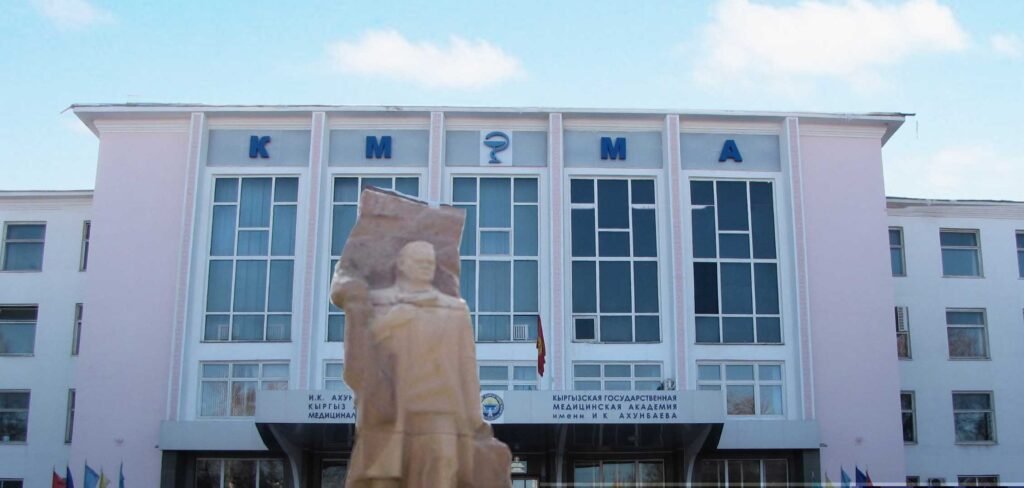Kyrgyz State Medical University
About Kyrgyz State Medical University

Image Source: https://en.wikipedia.org
The famed Kyrgyz State Medical University (KSMA), which is situated in Bishkek, Kyrgyzstan, is well known for its superior medical research and education. Since its founding in 1939, KSMA has a long history of generating highly qualified medical professionals who have significantly improved the healthcare industry both domestically and abroad. The school provides numerous undergraduate and graduate programmes in general medicine, dentistry, pharmacy, and nursing, among other medical specialties. With a focus on hands-on learning, KSMA offers students access to cutting-edge facilities, cutting-edge labs, and clinical experience in affiliated hospitals. The university draws students from a wide range of backgrounds and promotes a multicultural learning environment. The faculty of KSMA is made up of seasoned professors, medical professionals, and researchers who disseminate information using cutting-edge teaching strategies. The future of healthcare professionals is being significantly shaped by Kyrgyz State Medical University’s dedication to academic excellence and its extensive curriculum.
Overview
| Accepted Examination | NEET Qualification |
| Total Course Fees | $27,000/- |
| University Ranking | Country – 4 World – 8114 |
| Course Duration | 5 years + 1-year internship |
| Medium of Instruction | English |
| Recognition & Accreditation | NMC, WHO , AMEE , ECFMG , FAIMER, FPME |
| Location | Bishkek, Kyrgyzstan |
Why Study MBBS in Kyrgyz State Medical University?
- Quality Education: Education of the highest calibre is offered at the Kyrgyz State Medical University (KSMU), which is well-known for doing so. The programme is well-established, adheres to international standards, and emphasises academic understanding, practical skills, and clinical training.
- Degree Accepted: Major medical councils and organisations throughout the world, including the Medical Council of India (MCI) and the World Health Organisation (WHO), accept the MBBS degree granted by KSMU. Graduates can pursue medical jobs abroad thanks to this recognition.
- English as the Medium of Instruction: The MBBS programmes at KSMU are available in English, making them accessible to overseas students who may not be native speakers of the country’s tongue. This enables them to comprehend the ideas completely and interact with patients in a meaningful way during clinical training.
- Highly Qualified Faculty: The institution has a group of devoted, seasoned professors who are authorities in their professions. They establish a favourable learning environment by offering pupils thorough guidance and support.
- Affordable Tuition: Comparatively speaking, studying MBBS at KSMU is more affordable than in many other nations. For students looking for a top-notch education at an affordable price, Kyrgyzstan is a desirable alternative due to its cheaper tuition prices and living expenses.
- Modern Infrastructure: KSMU is outfitted with cutting-edge facilities, including well-stocked labs, libraries, and cutting-edge medical technology. These tools improve education and give students access to real-world situations.
- Opportunities for Clinical Training: KSMU collaborates with numerous hospitals and medical facilities, giving students many opportunities for clinical training. They can hone their practical abilities, engage with patients, and acquire confidence in actual medical situations thanks to this practical experience.
- Cultural Diversity: Studying at KSMU gives you the chance to encounter a wide variety of cultures. The university encourages a multicultural environment where students can benefit from one another’s backgrounds and viewpoints by welcoming students from different nations.
- Safe and Supportive Environment: The country of Kyrgyzstan is renowned for its warmth and safe environment. For the safety and well-being of foreign students, the nation offers a tranquil environment. In addition, KSMU provides aid with accommodations and counselling for students.
- Global Career Opportunities: MBBS graduates from KSMU have strong potential for international employment after graduation. The internationally recognised degree opens possibilities to employment at renowned hospitals, research centres, or the pursuit of higher education in medicine.
Benefits of MBBS in Kyrgyz State Medical University
- Quality and Affordable Education
- No Donation or Headcount
- Recognized and Valid Medical Degrees
- Qualified Faculties
- Comfortable Weather Conditions
- Peace and safe Environment
- Exposure & Recognition Around the World
- Easy Admissions Procedure
- No Entrance Fee or Covert Charges
- Cost-effective Fee Structure
Eligibility Criteria
✓ Candidates must be at least 17 years old to be considered for admission.
✓ Requirements must be full fill listed in the guidelines of NMC
✓ Must have Qualified in NEET Exam
✓ Valid Passport with a minimum validity of 6 months – 1 Year
✓The applicant must successfully complete the 10+2 standard from a reputable board with at least a 70% overall score in the fields of biology, physics, and chemistry.
Documents required
For successful admission for the MBBS programme candidate must present the following supporting documentation:
- Class 10th Marksheet
- Class 12th Marksheet
- NEET scorecard
- Original Passport
- Photo Copy
- Original PCC
Course Duration
Fee Structure
| Particular | Year 1 | Year 2 | Year 3 | Year 4 | Year 5 | Year 6 |
| Tuition Fee | $ 4500 | $ 4500 | $ 4500 | $ 4500 | $ 4500 | $ 4500 |
Note:
- $1 = Rs.80 (for calculation purposes.)
MBBS Syllabus
1st Semester:
- Kyrgyz language
- Kyrgyz literature
- Foreign language
- Normal physiology
- Latin language
- Mathematics
- Histology, cytology, embryology
- Normal anatomy
- Russian language
- Physical education and sports
- Chemistry
- Medical biology
2nd Semester:
- Biochemistry
- Normal physiology
- Normal anatomy
- Manas study
- Kyrgyz language
- Kyrgyz literature
- Histology
- Russian language
- Medical Biophysics
- Philosophy
- Physical education and sports
3rd Semester:
- Geography of Kyrgyzstan
- History of Kyrgyzstan
- History of medicine
- Nanotechnology in medicine
- Microbiology, Virology and Immunology
- Pathological anatomy
- Pathological physiology
- Psychology
- Introduction to Clinical Medicine
- Microbiological diagnosis of nosocomial Infections
4th Semester:
- Urinary system
- Respiratory system
- Digestive system
- Blood system
- Musculoskeletal system
- Patient Care
5th Semester:
- Basic pharmacology
- General hygiene
- Fundamentals of specific surgical infections
- Propaedeutic surgery
- Psychohygiene
- Endocrine system
- Dentistry
- Epidemiology
- Cardiovascular system
- Syndrom of hypophysis dysfunction
- Nervous system
6th Semester:
- Valeology
- Dermatovenerology
- Age physiology and pathology
- General hygiene
- Operative surgery
- Otorhinolaryngology
- Ophthalmology
- Pathological anatomy
- Rare dermatoses
- Cardiovascular diseases
- Rare hemispheric syndromes
- Respiratory diseases
- Diseases of the gastrointestinal tract
- Diseases of the urinary system
7th Semester:
- Professional diseases
- Medical Genetics
- Internal diseases
- Children’s diseases
- Surgical diseases
- Pediatric Surgery
- Operative Surgery
- Obstetrics and gynecology
- Elective subjects
- Neurology with the basics of neurosurgery
8th Semester:
- Obstetrics and gynecology
- Surgery
- Clinical Pharmacology
- Pediatrics
- Oncology
- Radiation therapy
- Urology
- Therapy
- Traumatology and orthopedics, children’s trauma
9th Semester:
- Infectious diseases
- Public health and healthcare
- Family medicine
- Tropical Medicine
- Psychiatry and narcology
- Epidemiology
- Phthisiology
- Children’s infectious diseases
10th Semester:
- Traumatology and orthopedics, children’s trauma
- Interdisciplinary comprehensive state examination
- Obstetrics and Gynecology
- Interdisciplinary Comprehensive State Exam: Pediatrics
- Anesthesiology, intensive care, emergency conditions
- Evidence medicine
- Interdisciplinary comprehensive State examination: Surgery
- General physiotherapy
FAQ
MBBS abroad is a better options then private medical in India, especially in terms of cost, private medical in India costs a fortune more then that of many countries abroad.
Expertise: Rare Education have years of experience and in-depth knowledge about the admission process, eligibility criteria, fees, and other requirements for pursuing MBBS abroad. We can guide you through the entire process and help you avoid common mistakes and pitfalls.
Time-saving: The admission process for MBBS abroad can be complex and time-consuming. Working with Rare Education can help save a significant amount of time as we can handle all the paperwork and follow-up for you.
Access to information: Rare Education have access to a wide range of information about various medical schools, their fees, and programs. We can help you compare and choose the best options based on your needs and budget.
Professional guidance: Rare Education can provide professional guidance on the best country and medical school to choose based on your academic background, personal interests, and career goals. We can also help you with the visa process, travel arrangements, and settling into your new surroundings.
Support throughout the Process: Rare Education provide ongoing support throughout the entire admission process and beyond. We can answer any questions you have, provide updates on your application status, and help resolve any issues that may arise.
Working with Rare Education for MBBS abroad admission can provide numerous benefits, including expertise, time-saving, access to information, professional guidance, and support throughout the process.
Comparing FMG exam with NEET, we can safely say it is not at all a tough exam. Although there are no specific matrix to judge how tough an exam is, but considering the passing ratio of FMG exam which is roughly 20-25% to that of the percentage of candidates who get selected for government medical college through NEET which is roughly 0.02%, FMG exam is definitely a tough exam in the field of medical studies.

